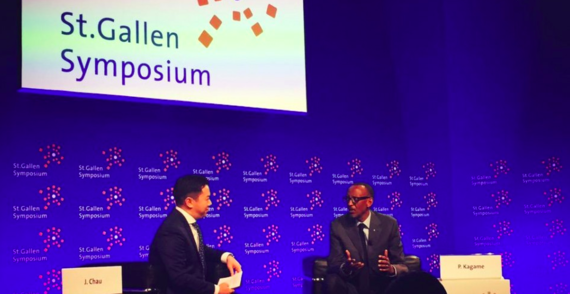At the opening of his lecture on big ideas for a small world at the 45th St. Gallen Symposium, the President of Rwanda, Paul Kagame announced, "There are small countries but there are no small peoples." Though many of his opinions remain controversial, the turnaround of Rwanda following a bloody history remains a vital lesson on how broken states can turn into successful nations. Even the Economist hailed current president as "one of the most successful leaders in modern African history."
I was struck by Kagame's personal background: a former refugee with a will strong enough to transform Rwanda's trials into a success, which the Economist describes as hard to imagine "without his disciplined and strategic presence." Freedom for Kagame was about choices, happiness and realizing satisfaction for what one wants in life. "Greatness is a choice available to any person," he encouraged Symposium participants. "Acting and thinking big are choices that are available to all of us. Nobody owes you anything," he insisted and reminded everyone that progress can never be taken for granted. In words that could be construed as motivational not just for countries but also individuals, Kagame advised that the individual always needs to strive to become better.
Kagame's advice may easily be discouraged and dubbed as "motivational bluff", but Kagame is a symbol that has delivered for his country. Over the last 15 years, Rwanda's score in the Human Rights Index has nearly doubled, and the GDP per capita has doubled from $200 to $400. Twenty-one years ago, following the Rwandan Genocide, a bright future seemed unlikely, with more than 2 million people fleeing to neighboring countries and the population decreasing even more. Public services no longer existed and the treasury was looted. Rwanda was deemed a lost cause and an unlikely candidate to survive as a nation. In order to restore a nation, it needed to be re-created from the scratch. "We had to try something radically new," Kagame explained. People should know what happened in the past, but they also needed a shared narrative about the future.
As we all can see from Kagame's government today, smallness does not have to be a disadvantage. Rwanda is structured as a collection of startups, making it easier to involve everyone. His plan applies not only to countries, but also to individuals and companies. Just because you are small presently does not mean you won't be big in the future. "If Rwanda can transcend its problems, anyone can," he concluded his speech. Evidently, circumstance's don't define your future, but your response to those circumstances does.
Theodora Karamanlis contributed editing to this piece.

